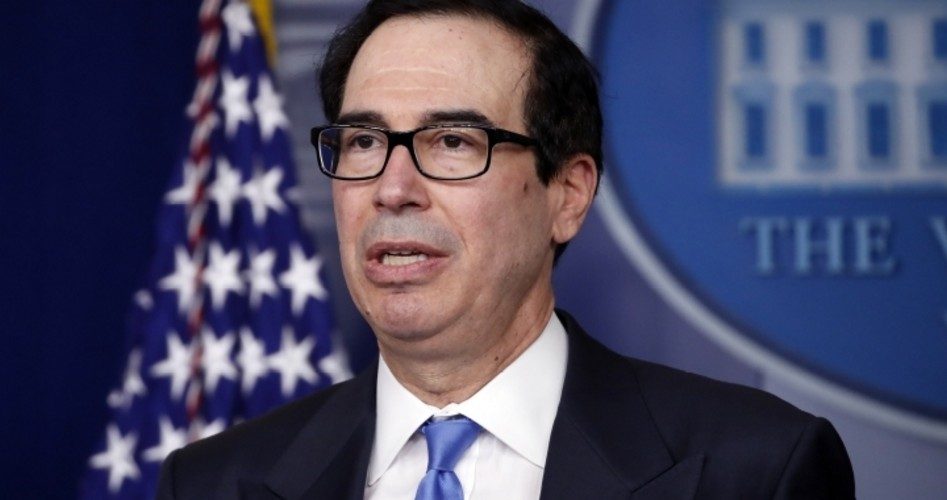
Speaking with Chris Wallace on Fox News Sunday on April 26, Treasury Secretary Steven Mnuchin (shown) predicted that the “trillions of dollars” that the federal government is pouring into coronavirus relief packages will cause the U.S. economy to “bounce back” during the late summer months.
After playing a video clip of President Trump saying that his administration was going to rebuild the economy better and “faster than people think,” Wallace asked Mnuchin how sharp a recovery he envisioned — and how soon.
Mnuchin replied:
Well, Chris, I think as we begin to reopen the economy in May and June you’re going to see the economy really bounce back in July, August, September. And we are putting in a unprecedented amount of fiscal relief into the economy. You’re seeing trillions of dollars that’s making its way into the economy and I think this is going to have a significant impact.
When Wallace observed that many financial experts — including those at the Congressional Budget Office and Mnuchin’s former company, Goldman Sachs — predicted a shrinking GDP, high unemployment, and a global hit that will be four times worse than the 2008 Great Recession, he asked Mnuchin if all of these experts were wrong.
Mnuchin said that this was not like the 2008 financial crisis because this time “we’ve closed the economy and we’re going to open the economy.”
Continuing, Mnuchin said, “This is a war. We’ll win this war, if we need to spend more money we will, and we’ll only do it with bipartisan support.” In response to that, Wallace told Mnuchin,
With all of the money that’s already gone out, the national debt will, by the end of this year, exceed the gross domestic product, the total output of the economy, it will be over 100 percent of GDP which has always been considered a kind of redline for stable economies. How much do you worry about a debt in excess of 100 percent of GDP?
Mnuchin’s answered, “The good news is that interest rates are extremely low. So if you look at the portion of the budget that we’re actually allocating to interest it’s extremely low and we’re locking in long term rates to make sure this additional money we’ve locked up for a long period of time.”
We observed on April 8 that Moody’s predicts that because of the CARES (Coronavirus Aid, Relief, and Economic Security) Act, our federal deficit will likely approach 10 percent of GDP. Fitch Ratings predicts it will be closer to 13 percent. Either of these predictions will exceed the previous post-World War II record for the deficit, set in 2009, when it was 9.8 percent of GDP.
In addition to the massive increase in our federal deficit, and the lack of constitutional authority to implement CARES, one can also question the wisdom of spending money to offset the economic impact of the government’s shutdown of the economy. These expenditures address symptoms, not the cause — the coronavirus, itself. Imagine if all of these funds were dedicated towards finding a vaccine for the COVID-19, instead of bailing out businesses and employees shut down by government edict.
Photo: AP Images
Warren Mass has served The New American since its launch in 1985 in several capacities, including marketing, editing, and writing. Since retiring from the staff several years ago, he has been a regular contributor to the magazine. Warren writes from Texas and can be reached at [email protected].
Related articles:
Government’s Coronavirus Stimulus Program Will Massively Increase National Debt
Was Thomas Massie Right? Stimulus Failures Vindicate Maligned Lawmaker




